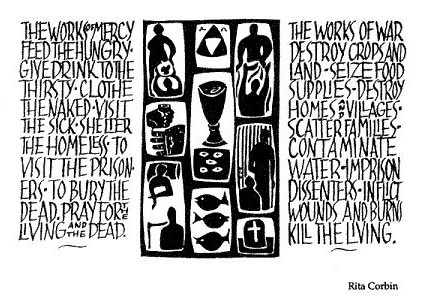Otherwise this stone would seem defaced
beneath the translucent cascade of the shoulders
and would not glisten like a wild beast's fur:would not, from all the borders of itself,
burst like a star: for here there is no place
that does not see you. You must change your life.
Rainer Maria Rilke, “Archaic Torso of Apollo”
…by journeying together and reflecting together on the journey that has been made, the Church will be able to learn through Her experience which processes can help Her to live communion, to achieve participation, to open Herself to mission.
“For a Synodal Church” the ‘Synod on Synodality’ Preperatory Document
Sunday, the feast of Corpus Christi, marked the opening of the United States Conference of Catholic Bishops’ Eucharistic Revival. This Sunday, I spoke to two young priests about the Synod on Synodality—a global ecclesial revival—and found they were lukewarm about its meaning and its process.
This is not uncommon in the U.S. Church. The Sixteenth Ordinary General Assembly of the Synod of Bishops, named the “Synod on Synodality” is supposed to be not just another meeting with an agenda, but an encounter. But, across the United States, bishops have failed to explain the terms that are not just Greek to most people but rather literally Greek. They have failed to explain why the Synod matters to each baptized Christian, and so priests have failed to understand why their parish community should embrace the Synod. Involved Catholics on parish councils have told me they have never heard of the Synod on Synodality, the movement the global Church has been partaking in for over half a year.
It is interesting, James noted, that a global intiative whose raison d’être was communal encounter had a hard time taking root in the individualistic United States. In America, community is scarce, and, instead, there are, as Margaret Thatcher once laid out, individuals, families, and the holy and catholic markets uniting them.
And it seems to me that until we understand the goal of the Synod on Synodality, and its purpose—listening to and encountering one another—and the sacredness of communal encounter, we will never understand the Eucharist.
Eucharistic reverence is often mostly parsed in terms of intimacy, and for good reason! Who am I that the mother of my Lord should come to me?
But the personalism of Eucharistic intimacy doesn’t mean that the primary importance of the Eucharist is about my individual encounter with Christ. The Eucharist—even Eucharistic adoration—cannot be understood outside of community. And it seems to me that the American Church does not know what its community is. Because we do not understand our own importance in our own Church, many Catholics do not understand what the Eucharist is, outside of its symbolic remembrance of Christ’s Last Supper.
If the American Church does not know what the Eucharist is, it because she does not know who the Mystical Body of Christ is. We are not just the community of those who receive Christ in the Eucharist, but the community of the faithful offer the Eucharist. The priest, when praying before lifting up the bread and wine, never says “I,” but says “we.” All the baptized present are that “we,” offering up the Eucharist together—uniting our sorrows, joys, faults and triumphs to the sacrifice of Christ.
We, each of us, is part of the Mystical Body of Christ that is bound together by our collective remembering of Christ’s gift of self in the Eucharist. We gather together in the liturgy, as commanded by Christ, to remember Christ’s love for the world. And we receive him again and again in the forms of bread and wine, not for ourselves, but for the world.
The Eucharist never stops at our tongue or at the Church doors. The Eucharist is the source of our faith—meaning it drives all our actions—and our faith’s summit—meaning that it shows us what our faith is striving for.
If we know what the Eucharist is, then we will understand there is a different way we must live together and in the world. Because we have received Christ’s body and also because we are his body.
The Synod on Synodality has asked the Church to address this very question: to rediscover who we are as Church. The Church has been asked to look inward. And when we look inward, that means looking at one another, looking at Christ.
The whole point of the Eucharist is that Christ is not “out there,” somewhere outside of myself, to be earned, achieved, reached, attained. The point is that Christ is within me, within you, within us—where two or three are gathered, our unity is Christ-shaped.
And when we truly open our ears to hear and encounter the mystery that is Christ-in-us?
We must change our life.





